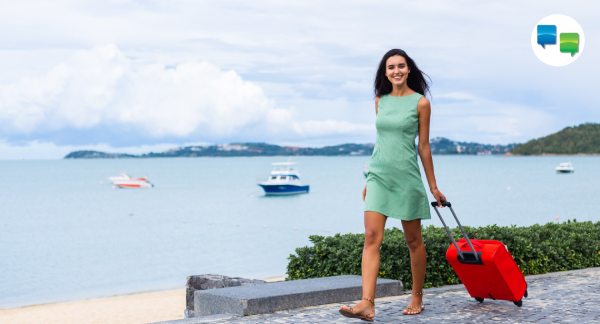Being a tourist in a country that you have never been before while being surrounded by things and places you have never experienced in the past could be a daunting task. The desire of wanting to explore everything all at once could become overwhelming, as can the fear of not being able to explore enough. But the excitement of being exposed to various cultures, customs, and languages surpasses every other feeling. You will perhaps get to learn so much.
Read this blog and know how you could visit a country and learn its language at the same time.
Whether you are going to Germany, Spain, France, Russia, Italy, Portugal or Japan, it is always possible to use your time abroad to learn their language. It is always easier when native speakers are around. Most will agree that the more languages one speaks, the bigger their horizons – and this is, after all, the biggest advantage of learning a new language.
So, here are ways that could help you learn a language and explore places simultaneously.

Create goals
Goals are the most vital part of an achievement. Everyone who has ever been successful has started by setting small goals and further proceeding to bigger ones. As a tourist wanting to do both, explore the country and learn its language, your goals must be the perfect blend of the two. It is quite possible to do both at the same time as well.
As an excited tourist, your smallest language learning goals needs to look something like this:
- This week, I am going to learn 20 new and useful everyday phrases.
- Every evening, I am going to spend at least an hour on language learning.
- Each day, I will learn a minimum of 10 new vocabulary words.
While your long-term goals could be like this, by the end of this vacation, I will be able to communicate in French, Italian, Spanish, and German (whichever country you are touring) with native speakers.
Use all the opportunities to practice the language
Finding a nice blend between two things could be tricky but it is not something that can’t be achieved. The key is to utilize every opportunity you can to practice the new language you are trying to learn. It would not be harder to practice, for instance, the French language in France. Find someone who can speak the language and put to good use what you have learned. If not, buy bread in France, order your food in French, ask for directions in French. Learning opportunities are everywhere around you.
In an attempt to use each opportunity as a tourist, you can define creative goals such as:
- I am going to book the hotel room by communicating completely in German/Portuguese/French/Spanish.
- I am going to learn two separate phrases in every new place I visit today.
- I am going to caption my social media travel photographs completely in Spanish.
Expedite the process (pack wisely)
If you aspire to learn a new language while also visiting a new country, you will need to stick to your committed goals. This is the reason you should always have your language learning app or dictionary at hand to make the procedure easier. You never know when an opportunity to learn a new phrase comes and, well, each new phrase is vital in its own way. Make certain to always keep notes of the things you learn. It is always good to keep handy the track of the process.
Being a tourist in a foreign nation means you will have a lot of essential things to carry around. In several countries, such as Germany for example, having a health insurance policy is completely mandatory, whether you are an international tourist or a student.
So, packed alongside your health insurance policy, passport, visa, and travel tickets, you should also keep your German dictionary and German language learning app very close to you. Best thing? Everything fits inside well in your handbag/backpack.

Take out some time to learn the culture
Once you become quite familiar with a country’s culture and customs and understand why they do the stuff they do, you will most probably find it easier to learn and make use of their vocabulary and phrases. Having some context before learning new things is mostly helpful, not just when it comes to languages. You might spend some time becoming familiar with the culture prior to starting your journey in a new country or even post that you arrive, simply make certain to plan your schedule accordingly.
Read while on the plane or train, watch videos, get some cultural insight. You will find it quite useful, both in the process of learning the language as well as during your journey.
Plan, simply plan
Last but certainly not least, planning! Planning is the single most integral part of the whole process. It stops you from giving up, getting overwhelmed, missing out on travels, and it makes the complete process fun and stress-free. Plan your schedule according to the duration of your trip. If you will merely be staying for a few weeks, your schedule would be tighter. If you are on a lengthy study abroad program as an international student, you will have a lot more time.
Plan your day prior or the week before, the sooner the better. Keep note of your plans and make certain you stay committed.

